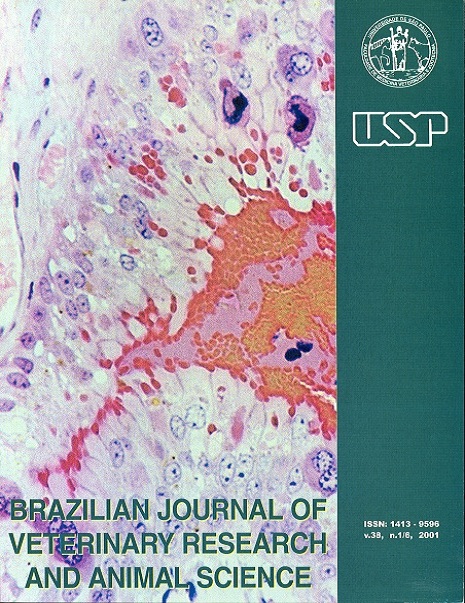Monitoring of neutralizing antibodies against infectious bovine rhinotracheitis virus in calves
DOI:
https://doi.org/10.1590/S1413-95962001000300006Keywords:
Infectious bovine rhinotracheitis, Herpesvirus 1 bovine, CalvesAbstract
The present study was accomplished in a farm in the municipality of Viradouro, in Northeast region of São Paulo State, aiming at monitoring during a period of 8 month the serum neutralizing antibody titers against BHV-1, in calves born from BHV-1 naturally infected or not infected cows. These cows were vaccinated and revaccinated against Infectious Bovine Rhinotracheitis (IBR) before parturition. The blood serum of 34 calves, separate in four groups, were analysed in this experiment. The results demonstrated that in groups of calves borned from soropositive and unvaccinated cows, the colostral antibodies persisted, in mean, until the calves were 3 months old. Calves borned from vaccinated cows, independent of these cows being infected or not, in general, presented means of antibody titers higher than the means presented by calves from unvaccinated cows. However, not even these antibody titers impeded the calves infection owing to high prevalence of BHV-1 (86.8%) in the locality of the study. The high prevalence of BHV-1 (86.8%) in the locality of the study resulted in the detection of maternal antibodies, by the serum neutralization test, in calves borned from uninfected cows, probably as a result of cows seroconversion in the interval between the screening test and parturition. The high prevalence also led to the infection of the calves from unvaccinated cows after the decline of colostral antibodies.Downloads
Download data is not yet available.
Downloads
Published
2001-01-01
Issue
Section
VETERINARY MEDICINE
License
The journal content is authorized under the Creative Commons BY-NC-SA license (summary of the license: https://
How to Cite
1.
Moreira SPG, Samara SI, Arita GMM, Ferreira F, Pereira GT. Monitoring of neutralizing antibodies against infectious bovine rhinotracheitis virus in calves. Braz. J. Vet. Res. Anim. Sci. [Internet]. 2001 Jan. 1 [cited 2024 Apr. 19];38(3):127-30. Available from: https://www.revistas.usp.br/bjvras/article/view/5896





